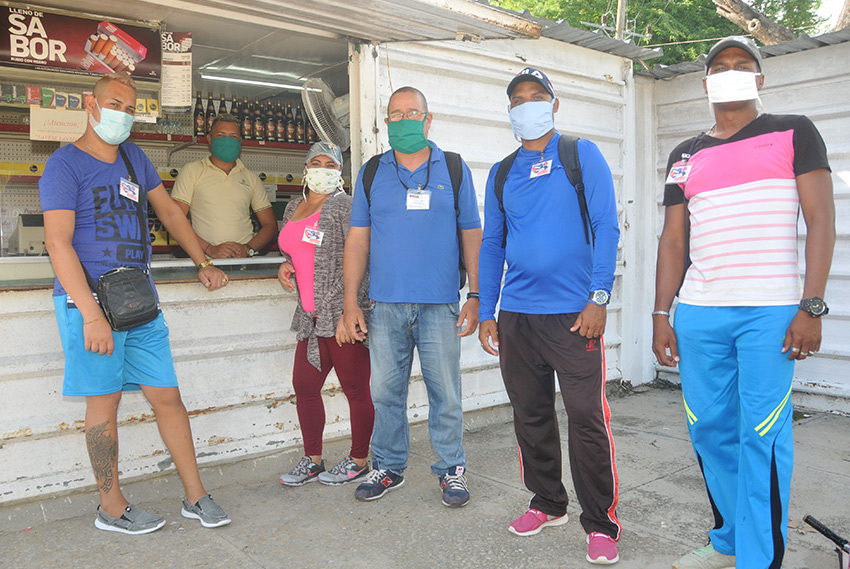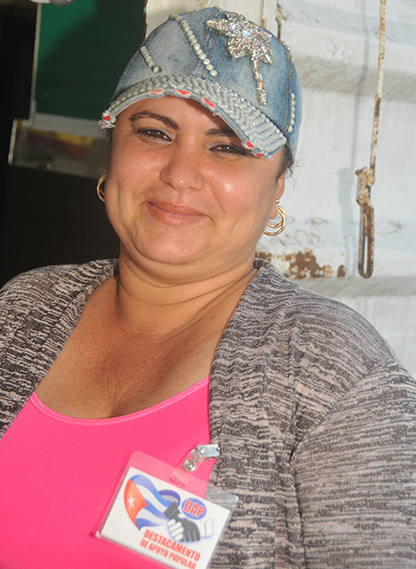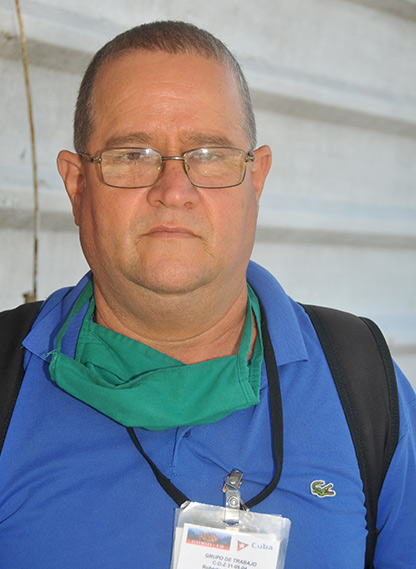
A few months ago she would not have imagined organizing queues: she would have laughed at the improbability of someone suggesting it. Today she tells me about her journey in the middle of a long and euphoric line of people, at the doors of a store of the Caribe Corporation, near Casa Piedra, in this city. She is not there to buy merchandise; she is moved by more collective causes: she watches over social distancing as protection against the dangers of the COVID-19.
 Las Tunas, Cuba.- María Esther Rodríguez has been teaching Spanish and literature for 19 years. Before that, she taught in the municipality of Majibacoa, her native land, and now in the Calixto Sarduy Junior High School in the capital city. She confesses that she enjoys the "intimate" space of her classroom, the self-absorbed teenage faces, but the epidemiological situation placed her on another stage and she assures that she will leave this one also with her hands full.
Las Tunas, Cuba.- María Esther Rodríguez has been teaching Spanish and literature for 19 years. Before that, she taught in the municipality of Majibacoa, her native land, and now in the Calixto Sarduy Junior High School in the capital city. She confesses that she enjoys the "intimate" space of her classroom, the self-absorbed teenage faces, but the epidemiological situation placed her on another stage and she assures that she will leave this one also with her hands full.
"As soon as the teaching process was interrupted, we were called to change our work - Maria Esther tells me. On April 10 we formed the Popular Support Detachment and the great challenge of organizing the queues, interacting with the population, explaining to them and demanding both the use of face masks and the separation of more than a meter between people began."
"I can't say that it has been easy. At the beginning what weighed most was the fear of catching the coronavirus and bringing it home to my son, my grandparents who are the most vulnerable link in my family. Now the epidemiological panorama is stable, but it was not always like that and just when I was most afraid, we had to mediate in the crowds and tumults."
"The first times some people looked at us badly. They thought we wanted to take advantage and buy, but time showed that this was never our intention. Today they already know us, they bring us water, coffee and even some snacks. After some time we have seen the gratitude, we have felt it and those interactions, I dare say, have even made us better people."
"I remember the first crowd to buy the chicken, the desperation of the people, the fear of the epidemic and of not reaching products. There we heard and saw bad postures, but nothing we couldn't control, and finally most of the customers returned home satisfied."
By now, Maria Esther has dealt with all kinds of queues: chicken, oil, food, cleaning. She has spent long hours standing, outdoors, in the sun and even in the rain. Her detachment has even started to produce a small farm that is already harvesting food.
She tells me that she has not done any feat that anyone would have stepped forward. And she assures me that it is gratifying to see the result of her efforts during these months of quarantine. "We are going to go back to school and be more objective and certainly more supportive," she says.
NO TIME FOR HESITATION
 He speaks fluently and very loquaciously, typical of good history teachers. He tells me that at the beginning of the quarantine he was taking food to five people who, due to various situations and pathologies, could not leave their homes. He worked for a while as a messenger, until he was called to join the Detachment of Popular Support and there, in line with the subject he teaches, he acted with a total sense of the historical moment.
He speaks fluently and very loquaciously, typical of good history teachers. He tells me that at the beginning of the quarantine he was taking food to five people who, due to various situations and pathologies, could not leave their homes. He worked for a while as a messenger, until he was called to join the Detachment of Popular Support and there, in line with the subject he teaches, he acted with a total sense of the historical moment.
"Yes, you always have your fears," said Reynel Bon Martínez. I remember people telling me 'Hey, take care of yourself' and I could see the concern on his face. In my case, my deepest fear was not getting sick, but infecting my mom or my sisters. But when you're busy with good causes, you don't hesitate too long.
The teacher also recalls the first line he "guarded". He says that the chicken sale went on until almost 3:00 am. They were half-dead from thirst, hunger and exhaustion, but that day everyone was able to acquire the merchandise they needed.
"The most difficult thing in this task is to please everyone. People come with their tensions, their worries, their needs, and sometimes they act explosively, but the ones who cannot be wrong are us. I have learned that from school, in dealing with my students' parents, because they are not always functional families and the challenge is to make ourselves understood.
"It's a beautiful job and I'm not exaggerating, even though it's from Monday to Sunday, one feels useful here. Not everything has been rosy. Once, in a line of food, we even received offenses, but then a lady returned with a delicious tea, as a collective apology and everything was settled".
This teacher, who now teaches at the Luis Urquiza Jorge Senior High School of Exact Sciences, assures that he will continue to organize the lines at the entrance of the stores as long as it is necessary. He has some experience, since he is also the president of CDR 3, Zone 38, District 29.
WITH THE PACT TO HELP...
Roberto Leyva Pérez walks among the 24 young people who make up the Popular Detachment that works in the Casa Piedra area. He has vast experience as head of the political-ideological workgroup in the Defense Council of Zone 310504, but he assures that, of all, this is the most important task he has carried out; one that had the "face of death" close to him.
He tells me that as soon as they were activated, the idea of creating a detachment to watch over the security of the people and the fulfillment of the established sanitary protocols arose.
We needed people who were trained for the task and we found them at the Calixto Sarduy secondary school," says Roberto. The teachers immediately took the step forward and since then they have grown in these tasks.
"They've done everything from organizing queues, surveying in the afternoons, to planting beans, sunflowers, sweet potatoes and so on at La Salina farm. They are ready when you call them and leave when the work is done.
"I've always been surrounded by youth and I can assure you that on this occasion these boys have responded well, no one doubts that they can handle the mission given to them..."
Leyva Pérez talks about the exploits of the "boys", although some are over 40 years old. She looks at them with pride and remembers every challenge in these long months of working and talking a lot.
He doesn't say that he has also arrived home in the early morning when the sales are extended, or that he gets up at dawn and is always ready to take care of his people and be not only the boss, but one of them. He has been a delegate for 14 years of the district where he works today, president of the popular council and of profession graduated in Physical Culture, X-ray technician, he is in his fourth year in Imaging and Medical Radiophysics, and at present he is the director of the Blood Bank of the province.
-------------------
Roberto, Maria Esther, Bon and many others faithfully guard their management areas. The detachment is heterogeneous and versatile. They say they have learned a lot from each other. They have listened to Roberto's anecdotes and enjoy the décima that come out of Maria Esther's chest instead of her own.
They talk to each other with respect and confidence. They predict that from these times of Covid-19 they will be left with the knowledge they have acquired interacting with the people, being judges and part of each day. Today they speak of personal growth, of commitment and, above all, of solidarity, because that is what the Popular Detachment is viscerally about.




